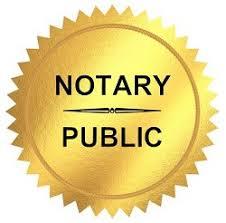Deceased Estate Management: Handling Possessions and Affairs After Passing
Debunking Notarial Work: Streamlining the Duty and Value of Notaries
Their role, usually shrouded in enigma for lots of, lugs substantial weight in making sure the legitimacy and stability of important records. By unraveling the complexities losing and surrounding notarial practices light on the value of their acts, a more clear understanding arises of the vital function notaries play in upholding the textile of lawful and legal arrangements.
The History of Notarial Work
How did notarial job evolve gradually to end up being an integral component of legal and company purchases? The background of notarial work go back to old worlds, where scribes played an essential duty in tape-recording vital information and validating records. As cultures advanced, the need for a more formalized system to ensure the validity of agreements arose. This led to the advancement of notaries, individuals designated by the state to work as unbiased witnesses in legal matters.
Throughout the Middle Ages, notaries obtained prominence in Europe, with their features increasing to consist of preparing lawful documents, certifying trademarks, and protecting documents. The rise of global trade better emphasized the value of notarial job in validating contracts and arrangements across borders.
In the contemporary period, notaries proceed to play a crucial role in legal and company deals by validating identifications, validating the credibility of papers, and preventing scams. Their role in certifying the credibility of agreements includes a layer of safety and security and depend the ever-evolving landscape of business and law.

Tasks and Obligations of Notaries
Notaries play a vital role in confirming the authenticity of documents and the identity of signatures. One of their main obligations is to witness the finalizing of crucial documents, such as agreements, actions, and wills, to ensure that all parties are entering into agreements knowingly and voluntarily.
Furthermore, notaries are entrusted with administering vows and affirmations, which are important in lawful proceedings and the implementation of affidavits. They accredit duplicates of original papers, giving assurance to institutions that the copies are real reproductions of the originals. Notaries need to preserve precise documents of all deals they supervise to guarantee transparency and responsibility. In general, the responsibilities and responsibilities of notaries are important in protecting the integrity and legality of different documents and deals.
Notarial Certificates and Signatures
Exemplifying thorough focus to detail, notarial certificates and trademarks offer as crucial parts in validating the authenticity of lawful papers. Notarial certificates typically consist of essential information such as the date of notarization, the names of the signatures, a summary of the paper, and the notary's main seal. These certifications offer a clear record of the notarial act, making certain that the file can be quickly recognized and mapped back to the notary who supervised the procedure.
Signatures play a crucial duty in notarial job, as they symbolize the agreement and approval of the celebrations entailed. Notaries carefully witness the signing of records to verify the identity of the signatories and confirm that they are signing of their own complimentary will. By affixing their official seal and trademark to the file, notaries license that the needed procedures have been complied with and that the record is enforceable and valid.
Essentially, notarial certifications and signatures are the characteristic of authenticity in lawful purchases, supplying guarantee to all events involved that the records are genuine and binding.
Relevance of Notarial Acts

Notarization Refine Explained
Explaining the registration process supplies clarity on the important actions associated with validating legal papers. The notarization process commonly begins with the private offering the paper to a notary public. The notary then validates the signer's identification through appropriate recognition methods. As soon as the identity is validated, the notary makes sure that the specific authorizing the record does so willingly and with no browbeating.

Final Thought

Notarial certifications generally consist of important information such as the date of registration, the names of the notaries, a description of the record, and the notary's main seal. These certificates give a clear document of the notarial act, making sure that the file can be conveniently determined and traced back to the notary that looked after the process.
By fastening their main seal and signature to the record, notaries accredit that the necessary treatments have been click here now adhered to and that the document is legitimate and enforceable.
By verifying the identity of the notaries, confirming their desire to enter right into the arrangement, and certifying the day and area of the signing, notaries play a crucial duty in maintaining the validity of lawful documents.After the record is authorized, the notary will fasten their main seal or stamp onto the record.